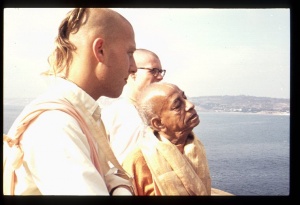SB 8.3.14: Difference between revisions
No edit summary |
(Vanibot #0054 edit - transform synonyms into clickable links, which search similar occurrences) |
||
| Line 23: | Line 23: | ||
<div class="synonyms"> | <div class="synonyms"> | ||
''sarva-indriya-guṇa-draṣṭre'' | ''[//vanipedia.org/wiki/Special:VaniSearch?s=sarva&tab=syno_o&ds=1 sarva]-[//vanipedia.org/wiki/Special:VaniSearch?s=indriya&tab=syno_o&ds=1 indriya]-[//vanipedia.org/wiki/Special:VaniSearch?s=guṇa&tab=syno_o&ds=1 guṇa]-[//vanipedia.org/wiki/Special:VaniSearch?s=draṣṭre&tab=syno_o&ds=1 draṣṭre]'' — unto the seer of all objectives pursued by the senses; ''[//vanipedia.org/wiki/Special:VaniSearch?s=sarva&tab=syno_o&ds=1 sarva]-[//vanipedia.org/wiki/Special:VaniSearch?s=pratyaya&tab=syno_o&ds=1 pratyaya]-[//vanipedia.org/wiki/Special:VaniSearch?s=hetave&tab=syno_o&ds=1 hetave]'' — who is the solution to all doubts (and without whose help one cannot solve all doubts and inabilities); ''[//vanipedia.org/wiki/Special:VaniSearch?s=asatā&tab=syno_o&ds=1 asatā]'' — with the manifestation of unreality or illusion; ''[//vanipedia.org/wiki/Special:VaniSearch?s=chāyayā&tab=syno_o&ds=1 chāyayā]'' — because of the resemblance; ''[//vanipedia.org/wiki/Special:VaniSearch?s=uktāya&tab=syno_o&ds=1 uktāya]'' — called; ''[//vanipedia.org/wiki/Special:VaniSearch?s=sat&tab=syno_o&ds=1 sat]'' — of reality; ''[//vanipedia.org/wiki/Special:VaniSearch?s=ābhāsāya&tab=syno_o&ds=1 ābhāsāya]'' — unto the reflection; ''[//vanipedia.org/wiki/Special:VaniSearch?s=te&tab=syno_o&ds=1 te]'' — unto You; ''[//vanipedia.org/wiki/Special:VaniSearch?s=namaḥ&tab=syno_o&ds=1 namaḥ]'' — I offer my respectful obeisances. | ||
</div> | </div> | ||
Latest revision as of 23:30, 18 February 2024

A.C. Bhaktivedanta Swami Prabhupada
TEXT 14
- sarvendriya-guṇa-draṣṭre
- sarva-pratyaya-hetave
- asatā cchāyayoktāya
- sad-ābhāsāya te namaḥ
SYNONYMS
sarva-indriya-guṇa-draṣṭre — unto the seer of all objectives pursued by the senses; sarva-pratyaya-hetave — who is the solution to all doubts (and without whose help one cannot solve all doubts and inabilities); asatā — with the manifestation of unreality or illusion; chāyayā — because of the resemblance; uktāya — called; sat — of reality; ābhāsāya — unto the reflection; te — unto You; namaḥ — I offer my respectful obeisances.
TRANSLATION
My Lord, You are the observer of all the objectives of the senses. Without Your mercy, there is no possibility of solving the problem of doubts. The material world is just like a shadow resembling You. Indeed, one accepts this material world as real because it gives a glimpse of Your existence.
PURPORT
To paraphrase this verse: "The objectives of sensual activities are actually observed by You. Without Your direction, the living entity cannot take even a step forward. As confirmed in Bhagavad-gītā (BG 15.15), sarvasya cāhaṁ hṛdi sanniviṣṭo mattaḥ smṛtir jñānam apohanaṁ ca. You are situated in everyone's heart, and only from You come remembrance and forgetfulness. Chāyeva yasya bhuvanāni bibharti durgā (BS 5.44). The living entity under the clutches of māyā wants to enjoy this material world, but unless You give him directions and remind him, he cannot make progress in pursuing his shadowy objective in life. The conditioned soul wrongly progresses toward the wrong objective, life after life, and he is reminded of that objective by You. In one life the conditioned soul desires to progress toward a certain objective, but after his body changes, he forgets everything. Nonetheless, my Lord, because he wanted to enjoy something of this world, You remind him of this in his next birth. Mattaḥ smṛtir jñānam apohanaṁ ca (BG 15.15). Because the conditioned soul wants to forget You, by Your grace You give him opportunities, life after life, by which he can almost perpetually forget You. Therefore You are eternally the director of the conditioned souls. It is because You are the original cause of everything that everything appears real. The ultimate reality is Your Lordship, the Supreme Personality of Godhead. I offer my respectful obeisances unto You."
The word sarva-pratyaya-hetave is explained by Śrīla Viśvanātha Cakravartī Ṭhākura, who says that a result gives one a glimpse of its cause. For example, since an earthen pot is the result of the actions of a potter, by seeing the earthen pot one can guess at the existence of the potter. Similarly, this material world resembles the spiritual world, and any intelligent person can guess how it is acting. As explained in Bhagavad-gītā, mayādhyakṣeṇa prakṛtiḥ sūyate sa-carācaram (BG 9.10). The activities of the material world suggest that behind them is the superintendence of the Lord.